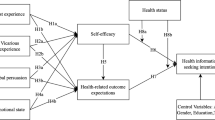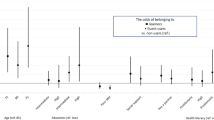Abstract
Given the aging population and the rapid development of digital society, concerns about promoting older adults’ health literacy are increasing. The broad impact of social media can play a vital role in health empowerment for older adults. Drawing upon the perspectives of social media affordances, we constructed a research model that integrates four affordance types, searching, meta-voicing, recommendation, and communication, to identify the effects of affordances and older adults’ subjective health literacy that contribute to their health-oriented usage intention of WeChat. Online survey data from 163 older adults (above 55 years) were collected and analyzed using partial least squares-structural equation modeling. This variable of subjective health literacy was divided into three dimensions: health knowledge, health management, and health skills. The results indicated that older adults’ subjective health literacy has significant positive effects on their health-oriented usage intention of WeChat. We also found that meta-voicing affordance, recommendation affordance, and communication affordance have positive influences on health knowledge and health management, and searching affordance, recommendation affordance, and communication affordance have positive effects on health skills. This study enriched the understanding of elders’’ subjective health literacy on their health-oriented usage intention of social media and contributed to the literature on health-related ICT usage targets of older adults.
Access this chapter
Tax calculation will be finalised at checkout
Purchases are for personal use only
Similar content being viewed by others
References
Zhang, X., Xu, X., Cheng, J.: WeChatting for health: what motivates older adult engagement with health information. Healthcare 9(6), 751 (2021)
Zhang, Y., Xia, T., Huang, L., Yin, M., Sun, M., Huang, J., et al.: Factors influencing user engagement of health information disseminated by Chinese provincial centers for disease control and prevention on WeChat: observational study. JMIR Mhealth Uhealth 7(6), e12245 (2019)
Rootman, I.: Literacy and health in Canada: is it really a problem? Can. J. Public Health 94(6), 405 (2003)
Shang, L., Zhou, J., Zuo, M.: Understanding older adults’ intention to share health information on social media: the role of health belief and information processing. Internet Res. 31(1), 100–122 (2021)
Zhao, Y.C., Zhang, Y., Tang, J., Song, S.: Affordances for information practices: theorizing engagement among people, technology, and sociocultural environments. J. Documentation 77, 229–250 (2020)
Karahanna, E., Xu, S.X., Xu, Y., Zhang, N.A.: The needs–affordances–features perspective for the use of social media. MIS Q. 42(3), 737–756 (2018)
An, S., Muturi, N.: Subjective health literacy and older adults’ assessment of direct-to-consumer prescription drug ads. J. Health Commun. 16(sup3), 242–255 (2011)
Rice, R.E., Evans, S.K., Pearce, K.E., et al.: Organizational media affordances: operationalization and associations with media use. J. Commun. 67(1), 106–130 (2017)
Chan, T.K., Cheung, C.M., Wong, R.Y.: Cyberbullying on social networking sites: the crime opportunity and affordance perspectives. J. Manag. Inf. Syst. 36(2), 574–609 (2019)
Majchrzak, A., Faraj, S., Kane, G.C., Azad, B.: The contradictory influence of social media affordances on online communal knowledge sharing. J. Comput.-Mediat. Commun. 19(1), 38–55 (2013)
Song, S., Zhao, Y.C., Yao, X., Ba, Z., Zhu, Q.: Short video apps as a health information source: an investigation of affordances, user experience and users’ intention to continue the use of TikTok. Internet Res. 31(6), 2120–2142 (2021)
Zhou, Q., Lee, C.S., Sin, S.C.J.: Beyond mandatory use: probing the affordances of social media for formal learning in the voluntary context. Proc. Assoc. Inf. Sci. Technol. 55(1), 608–617 (2018)
Zhang, L., Jung, E.H.: WeChatting for health: an examination of the relationship between motivations and active engagement. Health Commun. 34(14), 1764–1774 (2019)
Junglas, I., Goel, L., Abraham, C., Ives, B.: The social component of information systems—How sociability contributes to technology acceptance. J. Assoc. Inf. Syst. 14(10), 1 (2013)
Ye, X.H., Yang, Y., Gao, Y.H., Chen, S.D., Xu, Y.: Status and determinants of health literacy among adolescents in Guangdong, China. Asian Pac. J. Cancer Prev. 15(20), 8735–8740 (2014)
Tennant, B., et al.: EHealth literacy and web 2.0 health information seeking behaviors among baby boomers and older adults. J. Med. Internet Res. 17(3), e70 (2015)
Hsu, L.C., Wang, K.Y., Chih, W.H., Lin, K.Y.: Investigating the ripple effect in virtual communities: an example of facebook fan pages. Comput. Hum. Behav. 51, 483–494 (2015)
Saad, N.M., Alias, R.A., Ismail, Z.: Initial framework on identifying factors influencing individuals’ usage of telehealth. In: 2013 International Conference on Research and Innovation in Information Systems, ICRIIS, pp. 174–179. IEEE (2013)
Montanaro, E., Artusi, C.A., Zibetti, M., Lopiano, L.: Complex therapies for advanced Parkinson’s disease: what is the role of doctor-patient communication? Neurol. Sci. 40, 2357–2364 (2019)
He, Y., et al.: A reliability and validity study of the electronic health literacy scale among stroke patients in China. Top. Stroke Rehabil. 20, 1–9 (2021)
Stellefson, M., et al.: Reliability and validity of the telephone-based eHealth literacy scale among older adults: cross-sectional survey. J. Med. Internet Res. 19(10), e362 (2017)
Sudbury-Riley, L., FitzPatrick, M., Schulz, P.J.: Exploring the measurement properties of the eHealth literacy scale (eHEALS) among baby boomers: a multinational test of measurement invariance. J. Med. Internet Res. 19(2), e53 (2017)
Chung, S.Y., Nahm, E.S.: Testing reliability and validity of the eHealth Literacy Scale (eHEALS) for older adults recruited online. Comput., Inf., Nurs.: CIN 33(4), 150 (2015)
Zhao, Y.C., Zhao, M., Song, S.: Online health information seeking behaviors among older adults: systematic scoping review. J. Med. Internet Res. 24(2), e34790 (2022)
Jen, W., Hu, K.: Application of perceived value model to identify factors affecting passengers’ repurchase intentions on city bus: a case of the Taipei metropolitan area. Transportation 30(3), 307–327 (2003)
Straub, D., Boudreau, M.C., Gefen, D.: Validation guidelines for IS positivist research. Commun. Assoc. Inf. Syst. 13(1), 24 (2004)
Acknowledgment
This study was supported by the National Science Foundation of China (72204210) and Postgraduate Research & Practice Innovation Program of Jiangsu Province (No. KYCX22_0550).
Author information
Authors and Affiliations
Corresponding author
Editor information
Editors and Affiliations
Rights and permissions
Copyright information
© 2023 The Author(s), under exclusive license to Springer Nature Switzerland AG
About this paper
Cite this paper
Wang, X., Song, X., Zhao, Y.(. (2023). Effects of Older Adults’ Subjective Health Literacy on Health-Oriented Usage Intention of WeChat: Based on Social Media Affordances. In: Gao, Q., Zhou, J., Duffy, V.G., Antona, M., Stephanidis, C. (eds) HCI International 2023 – Late Breaking Papers. HCII 2023. Lecture Notes in Computer Science, vol 14055. Springer, Cham. https://doi.org/10.1007/978-3-031-48041-6_16
Download citation
DOI: https://doi.org/10.1007/978-3-031-48041-6_16
Published:
Publisher Name: Springer, Cham
Print ISBN: 978-3-031-48040-9
Online ISBN: 978-3-031-48041-6
eBook Packages: Computer ScienceComputer Science (R0)




